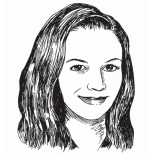Amber Tamblyn’s late twenties kicked her mind’s ass. It’s not an uncommon phenomenon: the slightly delayed quarter-life crisis, known to star-worshippers as the Saturn Return, is the period in which one’s life feels like it’s either thrown into total chaos or hitting the skids. Tamblyn, who muscled through the wilds of child acting and came out the other end an accomplished, sardonic, down-to-earth performer and writer, suddenly began to question everything about herself.
Before she began to experience the Fear, Tamblyn had been confident and assured, having already achieved so much by her mid-twenties. The thirty-two-year-old Emmy- and Golden Globe–nominated actress is perhaps best known for having played a teenager who talks to God in the CBS TV series Joan of Arcadia, and for her character, Tibby Tomko-Rollins, in The Sisterhood of the Traveling Pants movies. She has also appeared in the popular hair-raising films The Ring, The Grudge 2, 127 Hours, and the beloved television shows The Unusuals, House, and most recently the CBS sitcom Two and a Half Men, where she played Charlie Harper’s long-lost lesbian daughter, Jenny.
Yet Tamblyn, who grew up among bohemians (her unofficial godfathers are Neil Young and the late Dennis Hopper), says poetry was her first love, and one of the few areas in her life over which she had full control. It was that agency, perhaps, that pulled her back from the existential brink a couple of years ago. The result was Tamblyn’s third collection of poems, Dark Sparkler. It examines the lives and untimely deaths of young actresses such as Marilyn Monroe, Jayne Mansfield, Sharon Tate, and Brittany Murphy, and features artwork by David Lynch, Marilyn Manson, and Tamblyn’s father, veteran actor Russ Tamblyn (West Side Story, Twin Peaks). She has published two other acclaimed books of poems, 2005’s Free Stallion and 2009’s Bang Ditto, as well as two chapbooks, Of the Dawn and Plenty of Ships, which she made as a teenager. The topic of Dark Sparkler is one that’s not unfamiliar to the Los Angeles native, who began her own professional acting career at age eleven. Tamblyn says the collection is the death of her twenties on paper—“the death of somebody who didn’t believe in herself, who didn’t think her poetry was good enough, who didn’t think she was good enough to direct a film.”
I spoke to Tamblyn, who is very much alive and well, by phone from Los Angeles, where she was on the set of her directorial debut, a film adaptation of Janet Fitch’s...
You have reached your article limit
Sign up for a digital subscription and continue reading all new issues, plus our entire archives, for just $1.50/month.
Already a subscriber? Sign in





